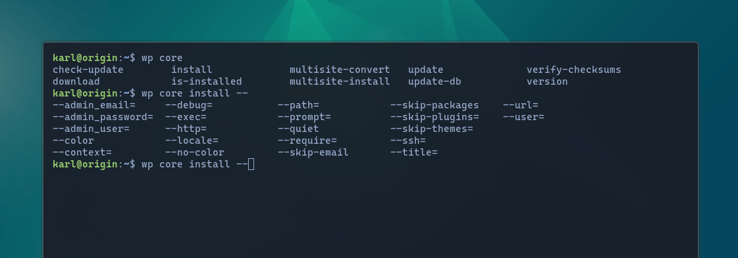Installing and maintaining WP-CLI
In this lesson you will install WP-CLI, the command-line interface for WordPress. You'll set it up system-wide so it's available everywhere on your server, configure bash autocompletion, and make sure it always runs under the safe www-data user instead of your privileged account. You'll also learn how to keep WP-CLI updated automatically with a cron job.
WP-CLI
WP-CLI is the official command line interface for WordPress. It allows you to install, configure and manage your WordPress sites without having to use wp-admin or even having a user account. It's an absolute must-have tool for anyone managing WordPress applications.
Installing WP-CLI
WP-CLI is written in PHP and packaged into a single executable PHAR file. You
can download this file from the official GitHub repository using curl:
curl -O https://raw.githubusercontent.com/wp-cli/builds/gh-pages/phar/wp-cli.phar
You can run it using php:
php wp-cli.phar --info
Or you can make it executable and run it directly:
chmod +x wp-cli.phar
./wp-cli.phar --info
We'll want to use the CLI from many different places on our server, so let's
make it available system-wide under the wp name, and change ownership to
root for consistency and security:
sudo mv wp-cli.phar /usr/local/bin/wp
sudo chown root:root /usr/local/bin/wp
wp --info
The wp command should run without errors and display WP-CLI version
information, along with some PHP and other environment details.
WP-CLI Completion
While this step is optional, I highly recommend setting up bash autocompletion
for WP-CLI. Grab the autocompletion.bash script from GitHub:
curl -o wp-completion.bash https://raw.githubusercontent.com/wp-cli/wp-cli/main/utils/wp-completion.bash
Use sudo mv to move it to your /etc/bash_completion.d directory:
sudo mv wp-completion.bash /etc/bash_completion.d/wp-completion.bash
You'll need to exit your current shell and log back in for this bash script to
be sourced automatically, or you can source it manually. After it's been
sourced you should be able to type wp, hit the tab key, and get a list of
available commands.
This works for options and flags too, as well as for third-party plugins providing custom WP-CLI commands.
Security & Permissions
There is a reason why we run our php-fpm pools using the www-data user and
not a privileged user (such as karl on my server) and definitely not
root. If a PHP plugin is malicious or vulnerable, running under a privileged
user, or a user with passwordless sudo access, can lead to a full system
compromise.
WP-CLI is no different. In fact, if you try to run WP-CLI as the root user,
you may see a big red "YIKES!" warning. However, running it under a user with
passwordless sudo privileges will yield no such error, even though it is
equally risky.
This article is for premium members only. One-time payment of $196 unlocks lifetime access to all existing and future content on wpshell.com, and many other perks.
